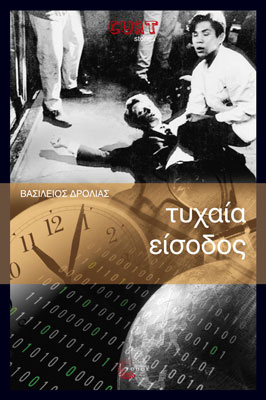 |
Random Entry
Drolias Basileios Pages: 240
Shape: 12,9 x 19,8
ISBN: 978-960-6760-74-7
Price: 13.20 €
::. Contemporary Greek Authors
::. Crime & Mystery
::. Political Fiction
|
|
Readers who selected this book also read:
The Chinese Room by Katerina Chrysanthopoulou
And yet this message meant something to someone. It wasn’t the rambling of some nutcase or the random automated creation of radiowaves and my voice. It was a tangible text that symbolized continuity for someone or some people. But it also symbolized my continued quest in a world that had become real and no longer hid behind codes, keys, and mathematical equations.
(…)
A name stood out from the message. It was SS. I immediately recognized the person and the act. What could a murderer have to do with all this? What did a man who had been locked up in jail for roughly forty years have to do with terrorism, the message and my life from now on?

Influenced by the writings of Thomas Pynchon, Paul Auster and J.L. Borges, Drolias examines in his book the way people comprehend and respond to events of chance in our media-centred, conspiracy-prone, deterministic society.
A romantic radio ham who persists in enjoying the loneliness of the radio world in the age of the internet accidentally picks up a coded message. Its origin and possible meaning and its implication in decision-making centers suddenly invade his secluded world and propel him into a frantic quest to solve the mystery. But is there such a thing as mystery in the cyberworld? Is there anything that’s a mystery for intelligence services? For reporters with the inside track?
A metal-head computer nerd, a quirky philosopher who doesn’t pigeonhole his thoughts according to cheap market categories, and a successful reporter who has open lines of communication to the establishment all become involved in deciphering the message. But the game takes unexpected turns as it touches international terrorism, national politics, and history: the assassination, forty years earlier, of U.S. Senator Robert Kennedy emerges as the sole solution to this incredible mystery. Yet reality is not always that spectacular. And when one event is the result of a random incident, for example a simple coincidence, few can accept it that easily.
The power of this compelling mystery lies in its ability to convincingly explain the social and psychological process that encourages everyone to model their thinking on a pattern dictated by the American media: conspiracy theory.
.jpg)
|

